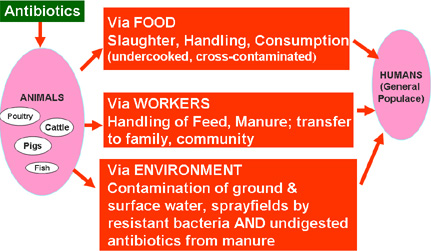- Fitness (19)
- News & Reviews (25)
- Nutrition (20)
- Science (10)
- Supplements (6)
- Technologies (8)
- The Arts (9)
Antibacterial Personal Care Products Are Linked to Allergies in Children
June 20th, 2012
 From Science Daily (June 19, 2012) This study gives us yet another reason to use more natural products! Cathie— Exposure to common antibacterial chemicals and preservatives found in soap, toothpaste, mouthwash and other personal-care products may make children more prone to a wide range of food and environmental allergies, according to new research from Johns Hopkins Children’s Center. Results of the NIH-funded study are published online ahead of print June 18 in the Journal of Allergy and Clinical Immunology.
From Science Daily (June 19, 2012) This study gives us yet another reason to use more natural products! Cathie— Exposure to common antibacterial chemicals and preservatives found in soap, toothpaste, mouthwash and other personal-care products may make children more prone to a wide range of food and environmental allergies, according to new research from Johns Hopkins Children’s Center. Results of the NIH-funded study are published online ahead of print June 18 in the Journal of Allergy and Clinical Immunology.
Using existing data from a national health survey of 860 children ages 6 to 18, Johns Hopkins researchers examined the relationship between a child’s urinary levels of antibacterials and preservatives found in many personal-hygiene products and the presence of IgE antibodies in the child’s blood. IgE antibodies are immune chemicals that rise in response to an allergen and are markedly elevated in people with allergies.
“We saw a link between level of exposure, measured by the amount of antimicrobial agents in the urine, and allergy risk, indicated by circulating antibodies to specific allergens,” said lead investigator Jessica Savage, M.D., M.H.S., an allergy and immunology fellow at Hopkins. Continue reading »
Never Go To Bed Angry
February 4th, 2012
 By Anahad O’Connor, the New York Times: Most people have heard the old saw about going to bed upset: Never do it, the saying goes, or the hard feelings will fester and resentment will build.
By Anahad O’Connor, the New York Times: Most people have heard the old saw about going to bed upset: Never do it, the saying goes, or the hard feelings will fester and resentment will build.Some say it goes back to the Bible, in Ephesians 4:26. “Let not the sun go down upon your wrath.” Regardless of its origins, the adage has been scarcely researched. But in a recent study in The Journal of Neuroscience, scientists found there might be a nugget of truth to it: Going to sleep after experiencing negative emotions appears to reinforce or “preserve” them.
Filed under Science | Comments Off on Never Go To Bed AngryLittle Bit of Exercise, Big Benefits
October 6th, 2011
 ScienceDaily: A new University of Colorado Boulder study shows that a small amount of physical exercise could profoundly protect the elderly from long-term memory loss that can happen suddenly following infection, illnesses or injury in old age.
ScienceDaily: A new University of Colorado Boulder study shows that a small amount of physical exercise could profoundly protect the elderly from long-term memory loss that can happen suddenly following infection, illnesses or injury in old age.
In the study, CU-Boulder Research Associate Ruth Barrientos and her colleagues showed that aging rats that ran just over half a kilometer each week were protected against infection-induced memory loss.
“Our research shows that a small amount of physical exercise by late middle-aged rats profoundly protects against exaggerated inflammation in the brain and long-lasting memory impairments that follow a serious bacterial infection,” said Barrientos of the psychology and neuroscience department.
“Strikingly, this small amount of running was sufficient to confer robust benefits for those that ran over those that did not run,” Barrientos said. “This is an important finding because those of advanced age are more vulnerable to memory impairments following immune challenges such as bacterial infections or surgery. With baby boomers currently at retirement age, the risk of diminished memory function in this population is of great concern. Thus, effective noninvasive therapies are of substantial clinical value.”
Filed under Fitness | Comments Off on Little Bit of Exercise, Big BenefitsAntibiotic Resistance
September 16th, 2011

A Report from the Physicians Committee for Responsible Medicine: The growing public health threat of antibiotic resistance is almost entirely attributed to antimicrobial use in animal agriculture.
Animals raised for meat and dairy products are routinely treated with antibiotics to promote growth and reduce the risk of illnesses that would otherwise be common in crowded living conditions. Currently, 80 percent of antibiotics used in the United States are administered to animals on farms.
Widespread use of antibiotics can give rise to resistant bacteria, which may or may not cause disease in the animals. Through contact with farm workers and contaminated waste runoff, resistant bacteria can spread to humans and to other animals.
Bacteria can also transfer resistance traits to other strains and classes of bacteria.
So the fewer antibiotics we consume on a daily basis through animal products, the healthier we’ll be! — Cathie
Filed under Science | Comments Off on Antibiotic ResistanceBetter Than Broccoli?
September 4th, 2011
 By Dr. John Dempster: Broccoli is part of the powerhouse brassica family of vegetables. Broccoli contains important phytochemicals that are released when they’re chopped, chewed, fermented, cooked or digested. The substances are released then break down into sulphorophanes, indole-3-carbinol and D-glucarate, which all have a specific effect on detoxification.
By Dr. John Dempster: Broccoli is part of the powerhouse brassica family of vegetables. Broccoli contains important phytochemicals that are released when they’re chopped, chewed, fermented, cooked or digested. The substances are released then break down into sulphorophanes, indole-3-carbinol and D-glucarate, which all have a specific effect on detoxification.
Broccoli sprouts can actually provide more benefit than regular broccoli as they contain 20 times more sulfurophane. Add these to your salads and get creative with them in your meals.
What do Broccoli Sprouts have in common with Beet Root, Sea Vegetables, Dandelions, Flax Seeds, Lemons, Garlic, Artichokes, Tumeric & Apples? All are natural, powerful detoxifiers and simple to add to our daily diets!
Healing Properties of Broccoli Sprouts: Continue reading »
Filed under Nutrition | Comments Off on Better Than Broccoli?



